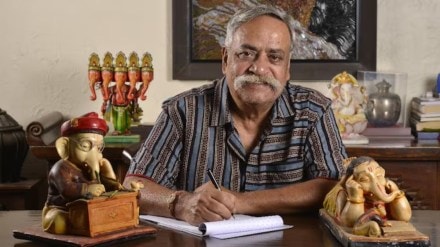It’s hard to believe that Piyush’s laughter is now only a memory.
What a remarkable era he defined — a man who made work feel like life itself. For him, emotion was strategy, and simplicity, a form of craft.
Piyush made a generation believe you could be yourself — rooted in your culture — and still create work that connects with everyone. He showed us that being real and emotional could be your greatest strength, not something to hide behind polish.
Once, at Cannes, we were on a bus heading to the venue. Out of nowhere, Piyush began humming a Rajasthani folk song and soon had the whole bus — people from all over the world — singing along. That was him: proud of who he was, wearing his roots like a medal, never pretending to be anyone else.
Anyone who met Piyush recognised the warmth he brought into every interaction. He had a wonderful way of twisting words, playing with phrases, and making you laugh when you least expected it. That was how he connected — through humour, language, and a sense of apnapan.
He made everyone feel included, reminding us that creativity is a shared joy.
He believed in getting his hands dirty. Never one to cut corners, he’d brainstorm ideas at a family gathering and join the festivities moments later. After late nights of work, I’d get his early morning call, his booming voice full of cheer: “Kahan ho, Tiger?” That spirit of tireless energy and joy in work continues to guide me today.
In an age when families drift apart, Piyush made sure his stayed close — his proud brother Prasoon, his wonderful sisters, nieces, nephews, and his wife Nita. He learnt that sense of sharing and togetherness from his mother, whom he spoke of with immense love. We’d often sit late into the evening, talking about them, eyes moist, hearts full.
I’ll never forget a walk with him on the promenade in Cannes. I asked, “At this stage in life, what would you tell me?”
He smiled and said, “Don’t change the authentic you.”
It reminded me of my own song — Rehna tu hai jaisa tu.
Piyush was about celebration — of life, people, and stories. He believed that what we create can shape culture and make people proud of who they are. He encouraged us to bring our rooted, authentic selves into the mainstream — to never be apologetic about being emotional, grounded, or real.
There used to be a misconception, especially among those from smaller towns, that the language we spoke at home didn’t belong in agency corridors. Piyush changed that. He urged everyone to use their own voice, to blur the line between who you are and what you create.
That’s what I learnt from him — that ideas don’t come from pretending. They come from honesty, from what you’ve lived, from who you truly are. Piyush will always be remembered for his fertile, generous, and genuine approach to creativity. For his laughter. For his courage. And for reminding us that being true to yourself is not just enough — it’s everything.
(The author is CEO & chief creative officer, McCann Worldgroup India)
